A Blessing for your "What if?"
For all self-doubters and weary comparers -- a new take on Kierkegaard’s parable of the naughty bird of comparison, and how to find grace nonetheless.
Friends,
I was looking for words for this week’s blessing.
And as many of you might know by now, I have no drawer full of writings from which to take one. My writing is itself a pilgrimage. Every midweek I arrive anew at an empty page waiting to be brought to life—to write something, hopefully, uplifting for the weary pilgrim.
Sometimes words spill out easily: from the impression of a late morning walk, from an inspiration over the week, or from the wisdom of my child.
And sometimes I sit before the page as empty as it is, the cursor blinking back at me like a small silent dare.
I might scroll through old posts, through other writers’ words for inspiration, or get lost in the newsfeed.
Today I stumbled upon the Substack of the wonderful
, theologian, mother, and storyteller behind “Everything Happens”.But instead of simply enjoying her lovely, witty reflections, something in me tightened—a little sting somewhere close to the heart, with a bitter aftertaste.
A naughty bird was whispering in my ear:
How in the world is she doing this?
Not only being a professor at a top school, but also publishing books, hosting a podcast, raising a child—all with grace and humor?
Ironically, it was her post on “practicing holy underachievement” that caught me off guard.
People, I felt defeated.
What she celebrated as “underachievement” still looked like more than I could ever dream of achieving.
The mischievous bird of jealousy crept into my heart. Surely I was not envying the parts of her story market by illness and pain—but still, I found myself wondering how my own life might have unfolded if only.
If only my nomination for a teaching position at the very same school had yielded fruit.
If only I could spend my days teaching and mentoring bright students, chatting with colleagues over coffee, belonging to a lively academic world.
I imagined that life so vividly that my own suddenly paled in comparison.
Do you know this feeling?
When you only see the sunlit side of someone else’s life and measure it against your own longings?
When your un-lived life, as depth psychologists call it, reaches out from the shadows and trips you, or rises like a wave and crashes over you?
When what others do seems so much brighter, braver, more alive—that your own work seems to wilt beside it? And your soul turns sour?
Being a soul carer, dear friends, doesn’t spare me from the rabbit hole.
And don’t get me wrong: there is merit in grieving the un-lived life, in mourning the possibilities that never came to be.
But when that grief turns into doubt about your own worth—then the slope becomes slippery indeed.
This time, I caught myself halfway down, remembering a story I once read by the Danish spiritual writer Søren Kierkegaard. His parable of the naughty little bird and the lily has stayed with me ever since.
So this week’s blessing comes from the library of my imagination, dear friend—an old parable retelling itself in me today, as I was visited once again by the bird of doubt. It came to remind me that grace sometimes waits not in brighter clearings, but right where we are—here, in the shade, in the very soil of our own becoming.
And if comparison has never been your cup of tea, if you’ve never felt that quiet ache of not being enough—then perhaps this story isn’t for you.
The Bird, the Flower, and the Doubt of Comparison
— A parable inspired by Søren Kierkegaard, retold by Almut Furchert
Once upon a time there was a little flower growing happily in a woodsy clearing beside a bubbling creek.
“Hello, little flower,” said a small bird one day. “How are you on this beautiful morning?”
“Just lovely,” said the flower. “The sun is shining, the rain has fed us well, and look at the leaves turning color—aren’t they glorious?”
“Oh yes,” chirped the bird, “pretty indeed. But do you know there’s another clearing where the sun shines much brighter than here?”
The little flower was flabbergasted.
“Another clearing?” she asked, confused.
You must know that this flower had grown up right there under the shade of a big birch tree. She had never known another place, and she loved it dearly—the morning light filtering through maple branches, the birds that came to drink at the creek, the insects that tickled her leaves.
What was this bird even talking about?
But soon he flew away, and she forgot about him. That evening she watched the flies dance in the sunset and closed her head with a sigh of contentment.
Days passed. Then, one bright morning, the bird returned.
“Hello, little flower,” he chirped. “How have you been?”
“Not too bad,” she answered, a bit more shyly. “Beautiful autumn days, really.”
“Yes indeed,” sang the bird. “But can you imagine how much more beautiful autumn is at the clearing I just came from?”
“More beautiful than here?” the flower exclaimed. “How is that possible?”
“Oh, it’s a much larger clearing, with tall trees in splendid colors. The air is fragrant with wild lilies; it smells like heaven.”
Something new stirred in the flower’s heart—an ache she didn’t quite recognize. Could there really be a place lovelier than her home?
When she turned to ask more, the bird was gone.
The sun seemed duller that day, and the sunset hid behind clouds.
The next morning, she found herself waiting for the bird.
When he finally came, her voice was tinged with longing.
“Oh,” he said, “I’ve just come from there again—the lilies are blooming, the soil is sweet, the air so free!”
The little flower sighed. She had never felt so small, so rooted, so stuck.
So they made a plan. The bird would come early the next morning, dig her up, and carry her to that bright clearing where she could grow among the grand lilies.
And so he came, pecked the soil from around her roots, lifted her carefully under his wing, and flew away.
But alas—on the way, the little flower withered.
O dear friends, what just happened?
Can you see that little lily, wilted on the bird’s wing? Doesn’t it look just like that feeling of defeat we started out with?
When the soil we grow in feels poorer than someone else’s, when our own life seems less fertile, when the garden next door always looks more alive.
What can we learn from this?
Kierkegaard wrote that the lily is us, and the bird is the restless spirit of comparison. It flies here and there, forever tempted by brighter places, forgetting the goodness of its own soil.
When we listen too long to that bird, it pecks away at our roots—our willingness to be what we are created to be. It tells us we’d thrive better elsewhere, when in truth, the light meant for us already shines right here.
The flower withers not because it lacked sunlight, but because it lost its ground.
So, dear One—
if the bird of doubt visits you, let it pass.
Do not let it build a nest in your heart.
Instead, sink your roots deeper into the soil that is yours.
Let grace find you right where you are.
May you stay rooted and alive in your own patch of earth.
May you trust that your light, though filtered through leaves, is no less divine.
And may you remember: the shade you stand in today may be someone else’s clearing tomorrow.
Peace and Love, Almut
PS: Please click the heart or leave us a note, e.g. a line which moved you, in the comments section. We tend to every one :-)
A Prompt for Reflection
When have you been tempted to leave your own “soil” because someone else’s life looked brighter?
What helps you return home to your own ground?
Thank you for reading, sharing and supporting Cloister Notes, an independent letter for dancing monks and weary pilgrims to deepen your path and find wisdom within. Your support makes this labor of love possible.
If you have been moved by what you are reading, consider becoming a paid subscriber, joining our intimate communion of fellow pilgrims on the deeper way. As a paid subscriber you have access to our live retreats and seasonal contemplations, like our upcoming 12 Days of Christmas Contemplations.
For as little as 5$ a month you keep this writer going, the lights on and the coffee brewing.
You can share this letter by simply forwarding this email, by sharing it on your social networks, or if you are a substacker, by restacking it.
Thank you, thank you.
More from The Cloister
Previous (Mid)weekly Blessings
From the On Being Human series
Upcoming
Our next Moral Monday / Monday Prayer circle will meet
November 10 — Moral Monday: “Taking Moral Action”
(via Zoom, 6:30–8pm CT)
with Drs. Chuck Huff & Almut Furchert
Our monthly Monday circles are meant as a protected space—a cloistered circle—where we can speak directly and unveiled, share our fears and hopes, and take courage together to build a better future. We end with a contemplative prayer time to hold our sorrows and hopes for the world—closing with a blessing.
Moral Mondays carry deep resonance: from the East German Monday Prayer services that helped bring down the Berlin Wall, to Rev. William Barber’s “Moral Monday” protests that is reshaping politics in North Carolina and beyond.
About Cloister Notes
A letter for dancing monks and weary pilgrims at the intersection of psychology, philosophy, and spirituality. Contemplations on being human to deepen your path, nourish your heart, and build wisdom within.
About The Weary Pilgrim
Almut is a German-American psychologist turned philosopher turned writer, traveler, photographer, retreat leader, and mother of a first grader. Her work engages with voices like Kierkegaard, Buber, Frankl, Yalom, Edith Stein, Bonhoeffer, and Hildegard of Bingen. A Benedictine Oblate, she lives with her family in a small college town in the American Midwest.



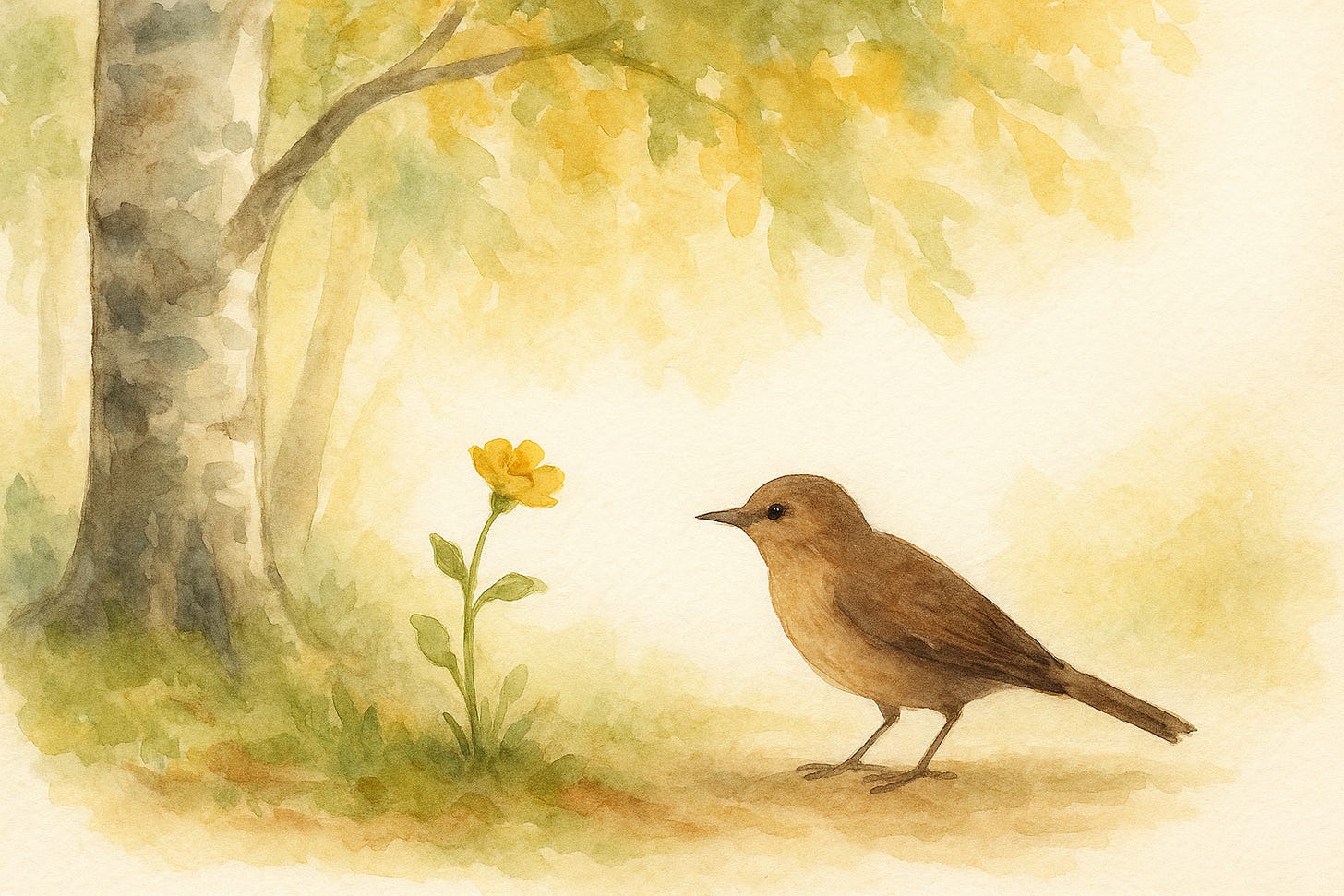
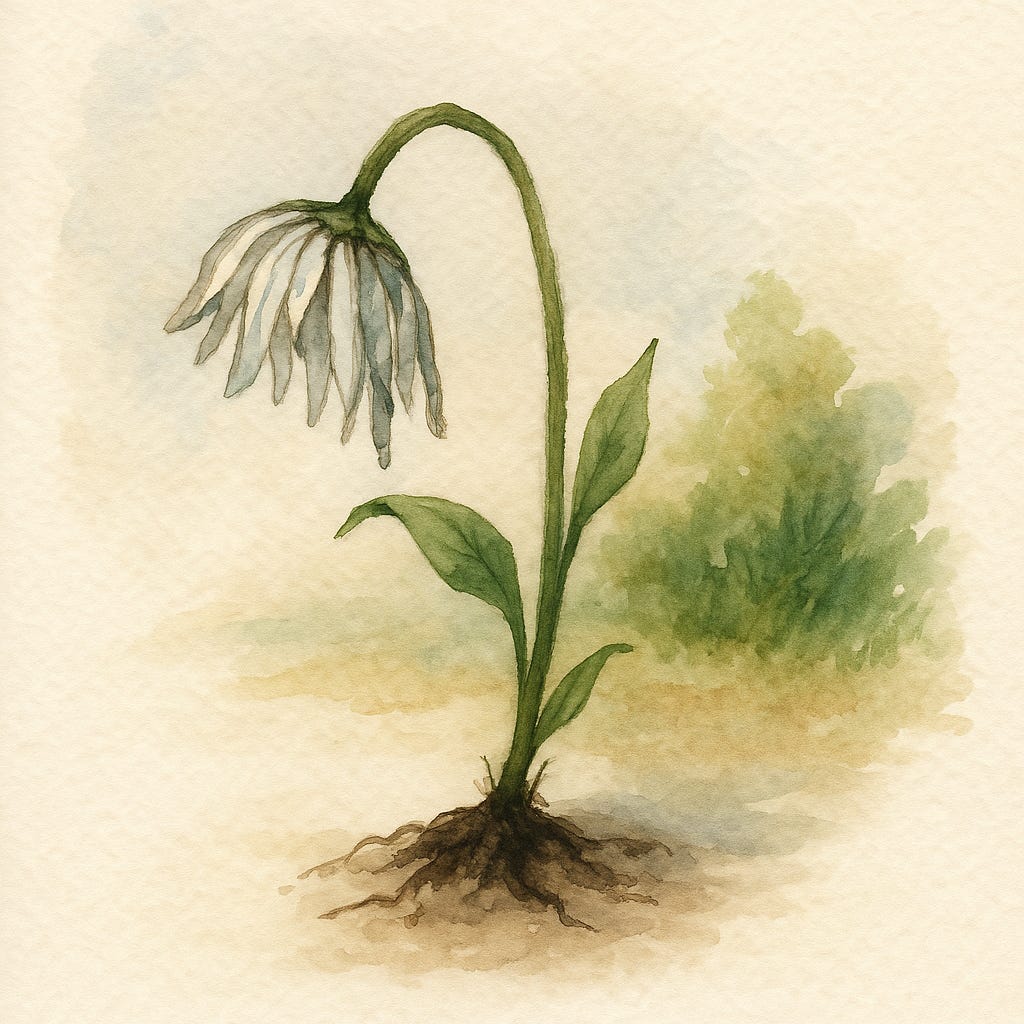

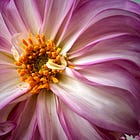
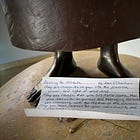
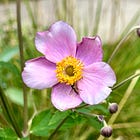
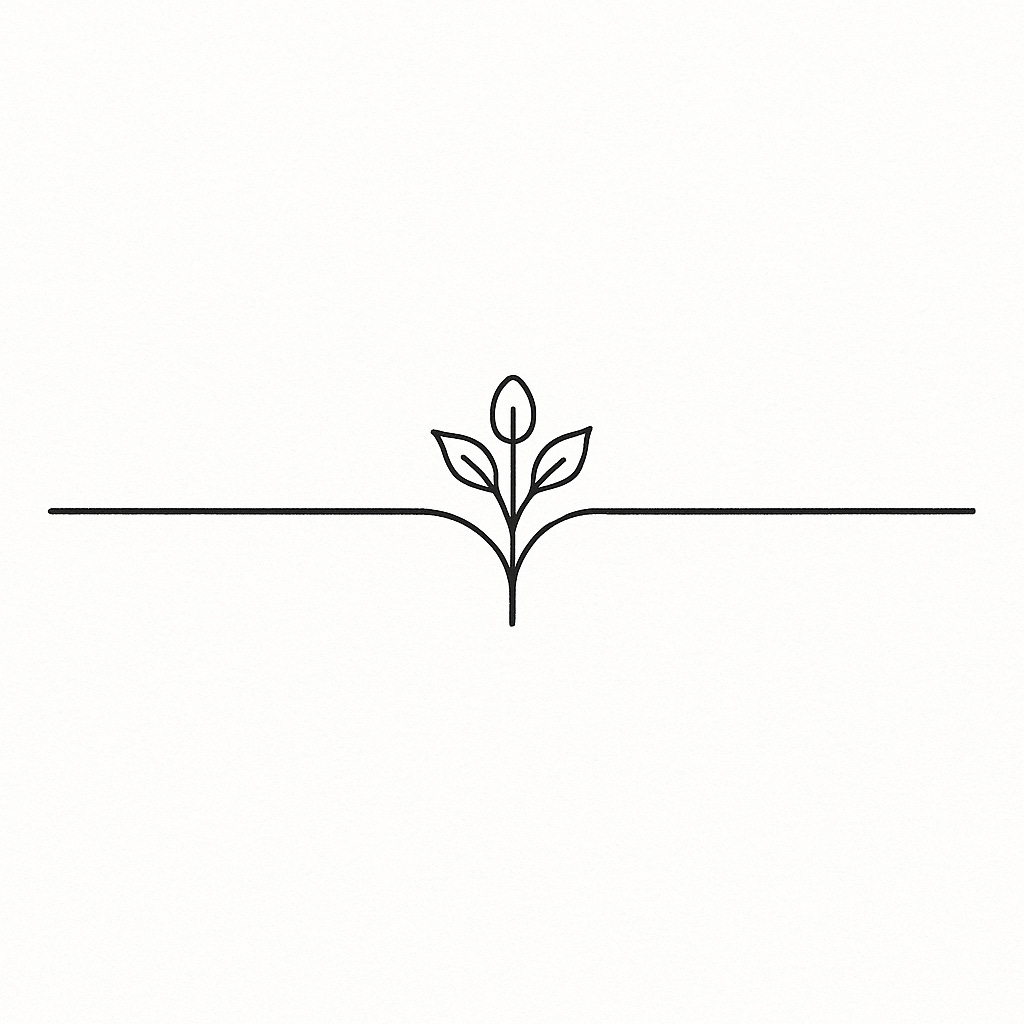
We need you here, Almut. I don’t know what it is about your presence and your way of speaking through writing—clarity, authenticity, simplicity, honoring, a place to stand, pause, breathe, and be cared for. I’m thankful that your life doesn’t seem to be lived in busy institutional places because then you would take us there instead of the profoundly beautiful, thoughtful, heart- and soul-centered places you invite us to share with you.
What If is what I can't say,
What If has no answer,
for I am clearly on my way
to meet the Lord, through cancer.
If Only merely weakens me
If Only takes away morale,
for I must stand and fight, you see
at my own OK Corral.
Am I the lawman, or the thug?
Does it really matter?
Am I the windshield, or the bug
that on fate's glass doth shatter?
I ponder this, the world goes round
as I stride across the bloody ground.